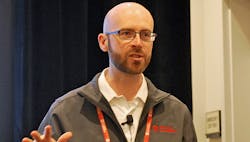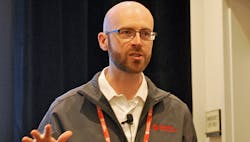Create and collaborate in the cloud
“The shared library can control and scale individual objects, such as adding new versions or required standards.” Rockwell’s Adam Gregory assured ROKLive attendees that the road to design in the cloud is modern and collaborative.
Because all digitalization roads lead to the cloud—and everyone is buying tickets to get there—designers want to accompany their monitoring, automation, control and manufacturing counterparts, so they can all collaborate happily together.
Rockwell Automation’s investment and vehicle for riding this big digitalization wave is FactoryTalk Design Studio, which is a cloud-native, software-defined, industrial-automation design suite and ecosystem. Its three primary characteristics are modern development functions to build and deploy solutions faster, multi-user collaboration tools to support scalable teams and varying skillsets, as well as multi-controller support for all devices to provide context across a user’s entire system. This means all controllers in the same system can be viewed and handled as one project, and the whole system can be seen at once.
FactoryTalk Design Studio, which is scheduled to be launched and available to users by the end of 2022, is built from the ground up to run natively in the could using containerized microservices, so it can scale quickly and easily, said Adam Gregory, commercial software leader for next-generation design software at Rockwell Automation. “This cloud-native architecture is different from our other efforts in the FactoryTalk Design Hub, where we're bringing our current generation of products like Studio 5000 Logix Designer into the cloud by hosting them on virtual machines running in Azure,” he explained in his presentation, “Next Generation System Design Sneak Preview of New FactoryTalk Design Studio” at ROKLive 2022 in Orlando, Fla.
SaaS ecosystem
As a member of Rockwell Automation’s overall, cloud-based FactoryTalk Hub software-as-a-service (SaaS) built on Microsoft Azure, FactoryTalk Design Studio consists of an ecosystem of software solutions that can all talk to each other. They can also share data across their services, such as emulation with FactoryTalk Logix Echo and simulation with Emulate3D software.
“FactoryTalk Design Studio’s cloud-hosted solutions provide the value of SaaS, foundational features and the benefits of frequent iterations,” added Gregory. “However, our on-premise Studio 5000 Logix Designer isn’t going anywhere because it’s an established product with a full feature set, and it will also get new features because we’re continuing to invest in it.”
The 3 Ms
Gregory reported that the modern aspects of FactoryTalk Design Studio include:
- enhanced modular development for developing and maintaining projects more easily with object-oriented programming concepts
- integrated library management that increases code standardization and reduces repetitive steps with integrated library tools
- browser-based, anytime/anywhere functions that ensure always-available access to the most up-to-date software and hardware resources.
“Modern really means smart software objects, groups of objects and routines that are reusable and scalable and can be defined and instanced out from a library,” explained Gregory. “Plus, any changes can be added to all the objects, and the shared library can control and scale individual objects, such as adding new versions or required standards.”
Meanwhile, the multi-user side of FactoryTalk Design Studio includes:
- native, multi-user collaboration that maximizes productivity across teams of all sizes with integrated, multi-user collaboration tools
- integrated version control that increases project development efficiency with Git software and other available functions; Git tracks changes in file sets; programmers typically use it for coordinating work on collaborative projects, such as developing source code
- text-to-graphical language flexibility, which enables power-user development with an entirely text-based project structure that automatically renders graphically.
“Multi-user supports multiple members on scalable teams and lets them share version control and repository functions,” said Gregory. “Users get their own projects, but they’re also alerted to changes made by other members, so they can keep one’s or another’s changes or both. Its background is open-text files, so users can update text in real time and push changes to their shared depository. They can also share commits, which are similar to safe rollback points, and compare them.”
Finally, the multi-controller side of FactoryTalk Design Studio consists of:
- multiple controllers in a single project, which streamlines development by configuring and managing all system controllers and devices in one development space
- flexible firmware compatibility, which reduces frustration by supporting multiple versions of controller firmware in a single environment
- logical hardware abstracted design, which delivers intuitive projects by building systems based on what they’re doing, rather than where they’re executing.
“This lets users view all their controllers as a system in the same project and be able to see all their logic in the same way, as well as move around and quickly adjust as needed,” added Gregory.
The editors of Control, Control Design and Smart Industry are reporting live from ROKLive 2022 in Orlando, Florida, to bring you the latest news and insights from the event. When the event comes to a close, the best, most important coverage will be compiled into a report by the editors.
Register now to pre-order the report and be among the first to receive it in your inbox.



